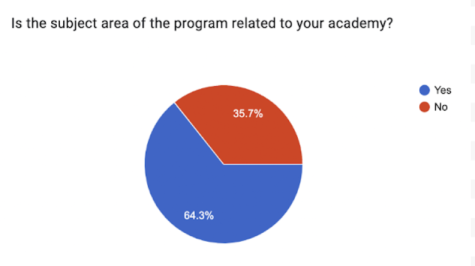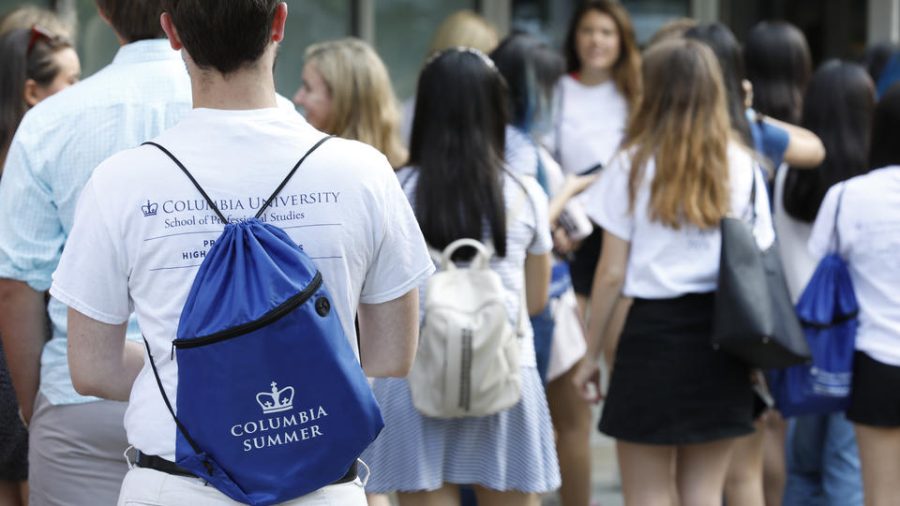Summer School’s Cool Again: An Inside Look at Pre-College Programs
March 13, 2023
To many go-getter high school students, summer is a time to prove themselves to admissions officers by attending pre-college programs at prestigious universities. BCA students are no different, with 44% indicating that they plan to attend one in the upcoming summer, according to a survey of 25 respondents. However, these programs often have a hefty price tag, leaving many to wonder if they actually improve students’ chances at top colleges or if they are simply cash grabs.
Student participants in the aforementioned survey cited plans to attend programs at Ivy League institutions, as well as other selective universities including Northwestern and Georgetown. While the vast majority of students plan to partake in university-affiliated programs, 30.8% said their programs are run by a third party organization.
Lucy Montalti, a junior in the visual academy, is planning to attend JCamp, a week-long journalism intensive hosted by the Asian American Journalists Association. Lucy specifically noted an interest in the program’s structure compared to university-affiliated programs. “I wanted a program that wasn’t lecture based and allowed me to actually participate in the topic I was learning about.”
When asked about the effect of her program in the college admissions process, she replied: “Compared to other programs, I think it is more helpful, as it is free, competitive, and hosted by an organization other than a university. However, I wouldn’t say that I chose this program because of that. Sure, I had college in mind when choosing to seek out a summer program, but I don’t believe that it’ll make or break my application in any way.”
The survey responses of BCA students echoed this sentiment. While 71.4% cited college admissions as a factor in their decision to apply to their chosen program, 100% said the subject area is of interest to them. Similarly to Lucy, many students wanted to explore anew discipline, with 35.7% reporting that their program’s field of study differs from the focus of their academy.

To gain a faculty perspective, the Academy Chronicle interviewed BCA’s Lead Counselor of College and Career Relations, Mr. Kaser. He said: “Colleges want to see how students are spending their free time in the summer. Yes, this should include vacations, beach time, and fun – but colleges also want to see students (especially rising seniors) doing something productive with their summer.”
He notes, however, that students should pursue activities they truly enjoy and that there are a multitude of ways for students to spend their summer valuably. Being passionate about one’s summer pursuits is incredibly important, especially as pre-college programs are by no means a guarantee to acceptance to that particular college.
“Pre-college programs are not run by the Admissions Department, and are usually completely unaffiliated with it. These programs serve as revenue generators for colleges, filling beds that would otherwise go unslept in, serving meals in dining halls that would be empty, etc.” Consequently, Mr. Kaser suggested that students should attend these programs if they are genuinely interested in learning more about the college or the subject area, not to increase their chances at their dream school.
In regards to the high cost of these programs, Mr. Kaser added: “If you are considering a program, you should have a clear idea of what to expect in terms of the programming that will be offered to you from the moment you wake up until the time you go to bed. You have to look at the experiences that are being offered to you and see if it equates to the price tag.”
Lucy reiterated this idea when asked about how cost plays a role in her decision to apply to certain pre-college programs. “I think any program above $6000-7000 would be enough for me not to apply. The ones that charge that much are typically from universities, which I feel don’t contribute much to a college application, so it just doesn’t seem worth it.”
While summer programs are certainly an important endeavor that show colleges that a student is furthering their education all year round, students should also remember to relax and enjoy their summer. “Summer should be FUN, and something you look forward to, no matter what you do with it,” said Mr. Kaser.
The opportunities for students are essentially endless, from community service to internships to summer courses. Ultimately, as Mr. Kaser alludes to, there is no wrong way to spend one’s summer. “However you use it, make sure that it speaks to your passions and gets you excited – you are told what to do for 10 months of the year – these are your two months to choose your own adventure!”





